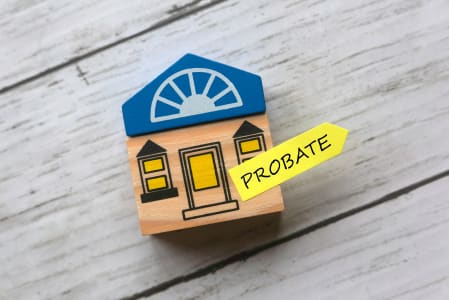
This article was last updated on 26/04/2024
The process of executing a will can often feel overwhelming, especially when you’re still grieving for your loved one. Receiving an inheritance as a beneficiary of a will can take months, or even years if the will is contested by other parties. That’s why many people hire solicitors to help them execute the will, and sort the estate of their loved one.
Inheritances come in all shapes and sizes, and your personal circumstances will likely have the largest influence on how you manage your inheritance. If you’ve got high interest debts, an inheritance could be an opportunity to clear your arrears and improve your credit score.
Once your financial past is taken care of, you can begin planning your financial future: your dream home, a comfortable retirement and maybe even a few luxuries along the way. Here’s a seven-step guide to managing your inheritance money:
Short-term goals
One of the first things you may wish to do is set yourself some short-term goals such as clearing any outstanding debts, or paying bills in advance to take a weight off your mind.
1. Budget and pay necessary bills
Even if the inheritance you’ve received has left you better off financially, it’s good practice to spend your money wisely. Start by sitting down and writing a list of all your monthly expenses, from household utilities to subscription packages. By looking over your outgoings, you might identify opportunities to cancel some unnecessary bills.
2. Create an emergency fund
Life can throw us some curveballs - which is why it’s recommended that everyone should have an emergency fund. A general rule of thumb is saving between three and six times your monthly expenses. This could help cover everyday costs if you lose your job, or need a new boiler, for example. Emergency funds are usually saved in easy access cash accounts, so you can get yourself out of a bind quickly.
3. Erase debt to improve credit
You don’t want past financial mishaps coming back to haunt you - or your credit score. In fact the higher your credit score, the more likely you’ll be accepted for a credit card or loan. It can even lower the interest rates you’ll pay, saving you money in the long run. Signing up to a credit score company can give you personalised insights into how to improve your own credit score. Often they’ll suggest taking actions such as paying off high interest debt you may have first, or being careful about not defaulting on your utility bills.
Long-term goals
You can also use your inheritance to secure your long-term savings goals. You may want to think about making your ideal retirement a reality: whether that’s travelling around the world or simply living without any financial worries.
4. Funnel money into your pension
Even if your inheritance is smaller, there are several ways you can use it to boost your pension balance. Most basic rate taxpayers benefit from a 25% tax top up on their pension contributions, up to an annual limit. So, for example, a monthly contribution of £100 into your pension would be topped up to £125 by HMRC. And, if you’re employed, make sure to check if you’ve been auto-enrolled into your workplace pension scheme.
5. Get on the property ladder
Being a mortgage-free property owner is a dream for many people. First-time buyers under 40 years old can save up to £4,000 per year towards a deposit with a Lifetime ISA (LISA), and receive a 25% top up on their contributions. The rest could be saved tax-free using a remaining annual ISA allowance of £16,000. So, it might be worth using some of that inheritance to start a LISA.
For mortgaged home owners, an inheritance may present an opportunity to reduce your loan value and increase your equity value. You could do this by setting up regular overpayments with your mortgage provider, or making a one-off lump sum overpayment. Many providers have an annual overpayment limit of 10% of your outstanding balance, meaning if you overpay too much, you may incur a penalty charge. Be sure to check with your mortgage provider before taking any action.
6. Put away a lump sum into savings
Savers are familiar with regularly squirrelling away smaller sums of money for their long-term goals. However, receiving an inheritance is a unique opportunity to make a large one-off contribution to savings pots, like your pension. You can receive pension tax relief on any contributions you make, up to 100% of your salary, capped at £60,000 gross for 2024/25. Depending on your pension contributions in the previous three tax years, you may be able to carry forward an annual allowance of up to £180,000.
7. Plan for your own inheritance
As morbid as it may sound, receiving an inheritance is a good reminder to get your own affairs in order. Whether that’s writing your will, notifying your pension provider of your pension beneficiaries, or making tax-free gifts to your loved ones. Each tax year you’re able to give away belongings or money, up to the value of £3,000, without it affecting the Inheritance Tax your beneficiaries may pay on your estate. This could help your loved ones with their own financial freedom. You can even carry over your unused annual exemption from the last tax year into the next.
Seven steps to managing your inheritance money
- Budget and pay necessary bills
- Create an initial emergency fund
- Erase debt to improve credit score
- Funnel money into your pension
- Get on the property ladder
- Make a lump sum saving
- Plan for your own inheritance
To find out more about inheritance money, listen to episode 20 of The Pension Confident Podcast. Our guests discuss the rules around inheritance tax, how to make sure your pension is passed onto beneficiaries and more. You can also read the full transcript.
Risk warning
As always with investments, your capital is at risk. The value of your investment can go down as well as up, and you may get back less than you invest. This information should not be regarded as financial advice.




